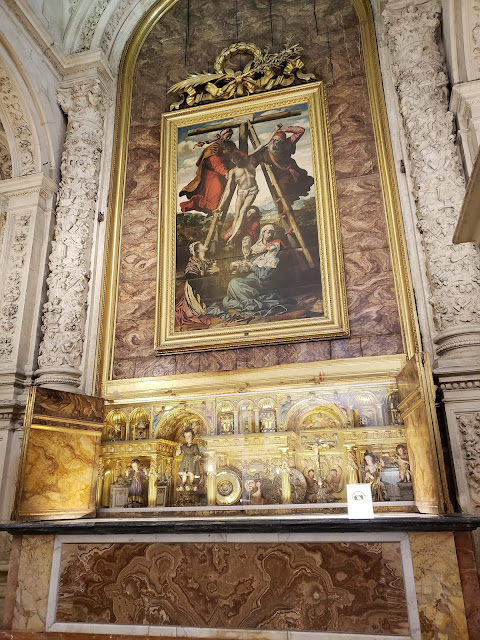James Doyle Penrose/Print Collector/Getty Images
Born in the year 672 AD in England, St. Bede was born around the time England was completely Christianized. He was raised from age seven in the abbey of Saints Peter and Paul at Wearmouth-Jarrow, and lived there for the rest of his life. Ordained as a Benedictine in 702 by Saint John of Beverley.
St. Bede truly shows forth the illustrious example of learning. He was far and wide considered the most learned man of his time, having written extensively on history, rhetoric, mathematics, music, astronomy, poetry, grammar, philosophy, hagiography, homiletics, and Bible commentary. His most authoritative and well known work is "Ecclesiastical History of the English People," a complete history of the English Church up until 731. The central theme of Bede’s Historia Ecclesiastica is of the Church using the power of its spiritual, doctrinal, and cultural unity to stamp out violence and barbarism.
The Saint was employed in translating the Gospel of St. John from the Greek up to the hour of his death, which took place on Ascension Day, 735. He was declared a Doctor of the Church on November 13, 1899, by Pope Leo XIII.
Traditional Reading at Matins:
Bede, a priest, was born at Jarrow, on the borders of England and Scotland. At the age of seven he was placed under the care of St Bennet Biscop, Abbot of Wearmouth, to be educated. He became a monk, and so ordered his life that, whilst devoting himself wholly to the pursuit of learning, he did in no way relax the discipline of his Order. There was no branch of learning in which he was not thoroughly versed, but his chief care was the study of the Holy Scriptures, and in order to understand them better, he learnt Greek and Hebrew. At the age of thirty he was ordained priest at the command of his Abbot, and, on the advice of Acca, bishop of Hexham, immediately undertook the work of expounding the Sacred Books. In his interpretations he adhered to the teachings of the holy Fathers so strictly that he advanced nothing which they had not taught, and even made use of their very words. He ever hated sloth, and by habitually passing from reading to prayer and from prayer to reading, he so maintained the fervour of his soul that he was often moved to tears while reading or teaching. He persistently refused the office of Abbot, lest his mind should be distracted by the cares of transitory things.
The name of Bede soon became so famous for learning and piety that Pope St Sergius thought of calling him to Rome so that he might help to solve the difficult questions which had then arisen concerning sacred things. He wrote many books to reform the lives of the faithful, and to defend and propagate the faith. By these he gained such a reputation in all parts that the holy Bishop Boniface, who was later martyred, called him a 'light of the Church.' Lanfranc styled him the 'teacher of the English,' and the Council of Aix-la-Chapeile ‘the admirable Doctor.' But as his writings were publicly read in the churches during his lifetime, and as it was not yet allowable to call him ‘saint,' they named him the ‘Venerable,’ a title which has ever remained peculiarly his. The power of his teaching was the greater because it was confirmed by holiness of life and the observance of religious discipline. Hence his own earnestness and example made his disciples, who were many and distinguished, eminent not only in learning but also in sanctity.
Worn out at length by age and labour, he was seized by a serious illness. Though his sufferings lasted more than seven weeks, he ceased not from his prayers and interpretation of the Scripture, for he was engaged in translating the Gospel of St John into English for the use of his people. But when, on the eve of the Ascension, he perceived that death was near, he asked for the last sacraments of the Church; then after he had embraced his companions and was laid on a piece of sackcloth on the ground, he repeated the words: 'Glory be to the Father and to the Son, and to the Holy Ghost,’ and fell asleep in the Lord. His body, which, as they say, gave forth a very sweet odour, was buried in the monastery of Jarrow, and afterwards translated to Durham with the relics of St Cuthbert. Bede, who was already venerated as a Doctor by the Benedictines and other religious Orders, was declared by Pope Leo XIII, after consultation with the Sacred Congregation of Rites, to be a Doctor of the universal Church, and the Mass and Office of Doctors was ordered to be said by all on his feast.
Collect:
O God, who dost enlighten Thy Church by the learning of blessed Bede, Thy Confessor and Doctor: mercifully grant to Thy servants ever to be enlightened by his wisdom and helped by his merits. Through…
Prayer Source: 1962 Roman Catholic Daily Missal


















